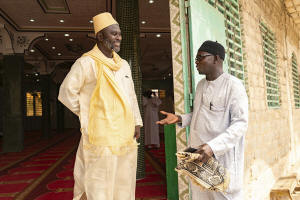Senegal's ‘schools for husbands’ aim to shift gender roles and keep
mothers from dying
[August 18, 2025]
By MARK BANCHEREAU
DAKAR, Senegal (AP) — On a recent evening in Senegal 's capital of
Dakar, an imam named Ibrahima Diane explained to a group of men why they
should be more involved in household chores.
“The Prophet himself says a man who does not help support his wife and
children is not a good Muslim,” the 53-year-old said, as he described
bathing his baby and helping his wife with other duties.
Some of the 14 men chuckled, not quite sold. Others applauded.
Diane was taking part in a “school for husbands,” a United
Nations-backed initiative where respected male community members learn
about “positive masculinity” in health and social issues and promote
them in their communities.
In Senegal, as in many other West African countries with large rural or
conservative populations, men often have the final say in major
household decisions, including ones related to health.
Women may need their permission for life-changing decisions on accessing
family planning or other reproductive health services, along with
hospital deliveries or prenatal care.
Following his sessions at the school for husbands, Diane regularly holds
sermons during Friday prayers where he discusses issues around gender
and reproductive health, from gender-based violence to fighting stigma
around HIV.
“Many women appreciate my sermons," he said. “They say their husbands'
behavior changed since they attended them." He said some men have told
him the sermons inspired them to become more caring husbands and
fathers.
Habib Diallo, a 60-year-old former army commando, said attending the
sermons and discussions with the imam taught him about the risks of home
births.

“When my son’s wife was pregnant, I encouraged him to take her to the
hospital for the delivery,” Diallo said. “At first, he was hesitant. He
worried about the cost and didn’t trust the hospital. But when I
explained how much safer it would be for both his wife and the baby, he
agreed.”
No more barking orders
The program launched in Senegal in 2011 but in recent years has caught
the attention of the Ministry of Women, Family, Gender and Child
Protection, which sees it an effective strategy to combat maternal and
infant mortality.
“Without men’s involvement, attitudes around maternal health won’t
change," said 54-year-old Aida Diouf, a female health worker who
collaborates with the program. Many husbands prefer their wives not be
treated by male health workers, she said.
The classes for husbands follow similar efforts in other African
countries, particularly Niger, Togo, and Burkina Faso, where the United
Nations Population Fund says it improved women’s access to reproductive
health services by increasing male involvement, growing the use of
contraceptives by both men and women and expanding access to prenatal
care and skilled birth attendants.
[to top of second column]
|

Imam Ibrahima Diane, left, advocate for an end to gender-based
violence and practices like female genital mutilation, discusses
with El Hadj Malick, coordinator of the "École des Maris" program at
the Great Mosque of Nietty Mbar in Thiaroye, a suburb of Dakar,
Senegal, Friday, July 4, 2025.(AP Photo/Sylvain Cherkaoui)
 Discussions for men also have
focused on girls’ rights, equality and the harmful effects of female
genital mutilation.
The program now operates over 20 schools in Senegal, and over 300
men have been trained.
In some communities, men who once enforced patriarchal norms now
promote gender equality, which has led to a reduction in the number
of forced marriages and more acceptance of family planning,
according to Senegal’s ministry of gender.
Men join the groups after being recruited based on trust, leadership
and commitment. Candidates must be married, respected locally and
supportive of women’s health and rights.
After training, the men act as peer educators, visiting homes and
hosting informal talks.
“My husband used to not do much around the house, just bark orders.
Now he actually cooks and helps out with daily tasks,” said Khary
Ndeye, 52.
Still too many dying in childbirth
While maternal and infant deaths in Senegal have declined over the
past decade, experts say it still has a long way to go. It recorded
237 maternal deaths for every 100,000 live births in 2023, while 21
newborns out of every 1,000 died within their first month. The U.N.
globally wants to reduce maternal deaths to 70 deaths per 100,000
live births and newborn deaths to under 12 per 1,000 by 2030.
One key problem was that many women have been giving birth at home,
said El Hadj Malick, one of the Senegal program’s coordinators.
“By educating men about the importance of supporting their wives
during pregnancy, taking them to the hospital and helping with
domestic work at home, you’re protecting people’s health,” Malick
said.
He said he still experiences difficulty changing mindsets on some
issues.
“When we just talk to them about gender, there is sometimes tension
because it’s seen as something abstract or even foreign,” Malick
said. Some men mistakenly believe such talk will promote LGBTQ+
issues, which remain largely taboo in much of West Africa.
"But when we focus on women’s right to be healthy, it puts a human
face on the concept and its becomes universal,” Malick said.
All contents © copyright 2025 Associated Press. All rights reserved |